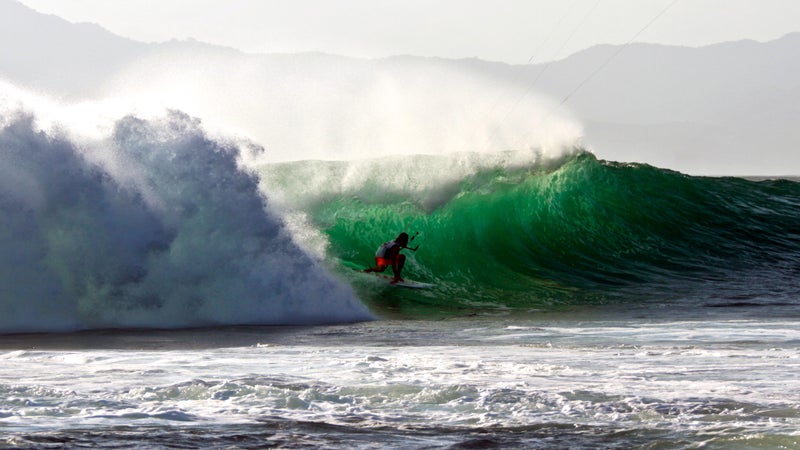Perhaps it’s not fair that after more than a decade successfully charging big waves, kite surfing, and now wingsuiting, pro athlete ��became internet famous for eating it big-time. On July 22, at Tahiti’s Teahupo’o—a break ��dubs one of the most intense in the world—cameras caught Porcella falling down the face of the wave, rolling over with the lip, then getting pummeled into the reef. (See the video below, which has been submitted for the .)
https://www.youtube.com/embed/WJuE8nQtv1w?rel=0
��
Australian surf mag ��dubbed the ��“The Heaviest Wipeout in All of Surf History?” But Porcella, who grew up in Maui and Italy, calls it a blessing. “I got more followers and more respect because of that wipeout than if I would’ve had I made that wave,” the 27-year old says. “Now I have 10,000 followers on !” Even more impressive: he came out pretty much unscathed. “My vest blew up, I hit the reef a bunch of times. I came out and spit blood five times and had a headache for three minutes,” Porcella says. “But I felt good. I decided, ‘you’re gonna go back out there and you’re gonna catch a bomb.’” And off he went, waiting for the next set. He’s been charging ever since.
It was a heaping dose of good luck that kept Porcella from becoming chum. But Porcella has also been training for a decade to be as resilient as possible in the face of disaster. “If you want to be good, you’re going to make some mistakes—injuries and mistakes are part of the game,” he says. “You just have to bounce back and learn something from it.”
What he’s learned is as helpful for extreme athletes as it is for weekend warriors trying to survive a local mud run. Below, Porcella shares his top tips for staying cool and unharmed, or for making a quick comeback when accidents happen.��
1. Crosstrain Hard

It’s a practice Porcella adopted after breaking his right wrist in a skateboarding accident and slipping two discs while kiteboarding when he was 15. “Just kiting was all I did—there was no physical preparation at all,” he says. So five days a week for an hour in the morning, he started working on speed, agility, strength, and explosive power in the gym with a trainer. That left the afternoon for cardio conditioning (running, swimming, or mountain biking), and for working on his kiting or surfing. The result: a stronger body less prone to getting torqued when the surf or wind changed.��
2. Stretch
After those early injuries, Porcella also started getting into yoga, martial arts, and gymnastics to keep his body limber and strong. “I can arch backward, touch my toes, put my head in between my legs, do the splits all three ways,” he says. Sure, some of that stretchiness must be genetic. But he also works at it constantly. “The key is to stretch everyday,” he says.��
When it comes to wiping out in a big wave, the stretchy-strength combo is crucial. “You have to be able to take an impact, but at the same time you have to be able to relax. If you’re too tense protecting yourself from hitting the reef, that’s when you have more chance of getting hurt, Porcello says.��
3. Hold Your Breath
This is a vital skill for any watersports athlete. As Surfline ,��“Breath holding trains the body to ignore signals from the brain that the body needs air. This may lead to increased confidence in the water for paddling into big waves and reduce risk of panic in hold-down situations.”
Porcella has trained himself to hold his breath underwater—without moving—for three minutes, 45 seconds. “I want to get up to five minutes,” he says.��
4. Use Positive Self Talk

“You want to be prepared mentally,” Porcella says. “You have more piece of mind if you’ve done the work,” he says. “It’s important to remind yourself: Because I did all of this, I deserve to be out there. I deserve to charge.”
That positive self talk also works when the worst happens—like when you eat it at Teahupo’o. “I just talk to myself: ‘Yeah buddy, you’re gonna be alright. You’re gonna come out of this and you’re gonna scream like an animal because you are.’”
5. Know What You Want
“Figure out exactly what you want in your life. That’ll help you control your feelings and help you stay focused,” says Porcello, especially when you suffer a setback. “I always wanted to be a little Bruce Lee. Maybe I can even be the next new Laird,” he says. “I want to be charging when I’m 45, 50, doing what I love.”


